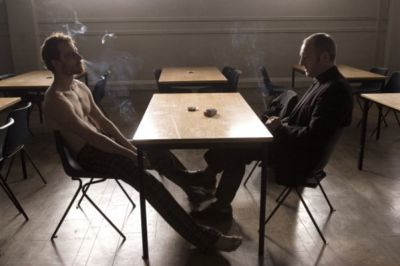Reviews - Hunger
Hunger
Reviewed By John Stakes

Hunger
First released to cinema audiences in the UK on 31st October 2008 having premiered at Cannes earlier in the year, Steve McQueen’s harrowing and challenging study of events in the Maze prison in 1981 in the six weeks leading up to the death of Provisional IRA member and would-be politician Bobby Sands arrived second time around in Keswick last Sunday garnered with awards and critical acclaim.
McQueen’s film is primarily a scathing attack on the then prevailing prison conditions which included 24 hour confinement except to attend weekly church, and routine beatings.. Having been denied the status of political prisoners, and having therefore refused to wear prison clothes, inmates staged a “dirty” protest of self debasement so graphically depicted that the stench was palpable. For this they were beaten by baton wielding and shield wearing officers in riot gear.
It is arguable that by deliberately not identifying the crimes for which they were incarcerated McQueen signals where his sympathies may well lie and where he feels ours perhaps should be, but that apart, his film focuses on the torture inflicted under the guise of punishment to demonstrate the futility of using institutional violence as a means of quelling the IRA spirit. McQueen balanced the stomach turning brutality inflicted by the prison staff by revealing its brutalising effect on some of their colleagues, and the killing of one of the guards Raymond Lohan by the IRA as he delivered a bunch of daisies to his comatose mother in a care home. The Maze was depicted as an internal manifestation of the “troubles” outside, in which the prison system was a cloak to enforce unionist hatred.
At the same time McQueen’s film developed into a personal study of Sands as he resurrected the hunger strike as a political weapon when the IRA campaign stalled. He held steadfast in his belief in the cause of republicanism (rooted in his childhood experiences ) which he felt would be advanced if he were prepared to commit suicide by fasting and used the weekly church meetings to recruit. He was challenged by his local priest (Liam Cunningham) in a notable and riveting 25 minute sequence in which for 17 minutes the camera is focused in a single static take on the two men as they confront each other and Sands explains why he feels he must sacrifice himself as the priest tries and fails to dissuade him.
Michael Fassbender delivers a powerful and utterly convincing performance as Sands particularly in displaying the inner calm of a man whose convictions remain unshakeable when tested in the extreme. The deterioration in his physical condition as death approaches makes for some very uncomfortable viewing but reveals his capacity to endure pain however inflicted. Shortly before his death Sands is elected to the British Parliament and his and the death of eight of his inmates prompts the Government to grant prisoner rights but not political recognition. Four years later the Anglo-Irish Agreement is signed which eventually lead to the Good Friday Agreement in 1998
The success of McQueen’s film can be measured not so much by the gathering of awards but more by the depth of its impact long after the final credits have rolled. The graphic yet honest depiction of the combined horrors of self debasement and prison violence in appalling conditions, served to generate a better understanding of a pivotal period in Anglo-Irish relations whilst underlining the need to find a political solution to any conflict with a political dimension. A bold and masterful piece of film making.
McQueen’s film is primarily a scathing attack on the then prevailing prison conditions which included 24 hour confinement except to attend weekly church, and routine beatings.. Having been denied the status of political prisoners, and having therefore refused to wear prison clothes, inmates staged a “dirty” protest of self debasement so graphically depicted that the stench was palpable. For this they were beaten by baton wielding and shield wearing officers in riot gear.
It is arguable that by deliberately not identifying the crimes for which they were incarcerated McQueen signals where his sympathies may well lie and where he feels ours perhaps should be, but that apart, his film focuses on the torture inflicted under the guise of punishment to demonstrate the futility of using institutional violence as a means of quelling the IRA spirit. McQueen balanced the stomach turning brutality inflicted by the prison staff by revealing its brutalising effect on some of their colleagues, and the killing of one of the guards Raymond Lohan by the IRA as he delivered a bunch of daisies to his comatose mother in a care home. The Maze was depicted as an internal manifestation of the “troubles” outside, in which the prison system was a cloak to enforce unionist hatred.
At the same time McQueen’s film developed into a personal study of Sands as he resurrected the hunger strike as a political weapon when the IRA campaign stalled. He held steadfast in his belief in the cause of republicanism (rooted in his childhood experiences ) which he felt would be advanced if he were prepared to commit suicide by fasting and used the weekly church meetings to recruit. He was challenged by his local priest (Liam Cunningham) in a notable and riveting 25 minute sequence in which for 17 minutes the camera is focused in a single static take on the two men as they confront each other and Sands explains why he feels he must sacrifice himself as the priest tries and fails to dissuade him.
Michael Fassbender delivers a powerful and utterly convincing performance as Sands particularly in displaying the inner calm of a man whose convictions remain unshakeable when tested in the extreme. The deterioration in his physical condition as death approaches makes for some very uncomfortable viewing but reveals his capacity to endure pain however inflicted. Shortly before his death Sands is elected to the British Parliament and his and the death of eight of his inmates prompts the Government to grant prisoner rights but not political recognition. Four years later the Anglo-Irish Agreement is signed which eventually lead to the Good Friday Agreement in 1998
The success of McQueen’s film can be measured not so much by the gathering of awards but more by the depth of its impact long after the final credits have rolled. The graphic yet honest depiction of the combined horrors of self debasement and prison violence in appalling conditions, served to generate a better understanding of a pivotal period in Anglo-Irish relations whilst underlining the need to find a political solution to any conflict with a political dimension. A bold and masterful piece of film making.
Find A Film
Search over 1500 films in the Keswick Film Club archive.
Friends
KFC is friends with Caldbeck Area Film Society and Brampton Film Club and members share benefits across all organisations
Awards
Keswick Film Club won the Best New Film Society at the British Federation Of Film Societies awards in 2000.
Since then, the club has won Film Society Of The Year and awards for Best Programme four times and Best Website twice.
We have also received numerous Distinctions and Commendations in categories including marketing, programming and website.
 Talking Pictures
The KFC Newsletter
Talking Pictures
The KFC Newsletter
Links Explore the internet with Keswick Film Club


